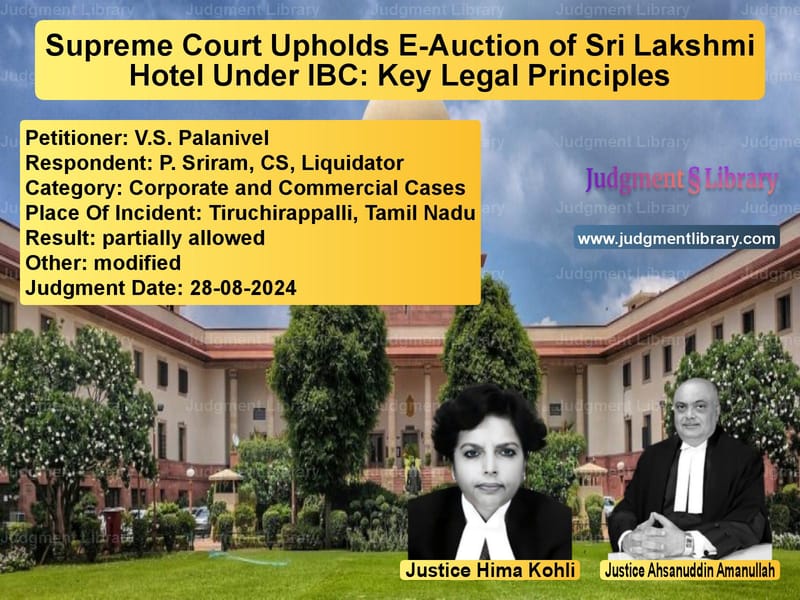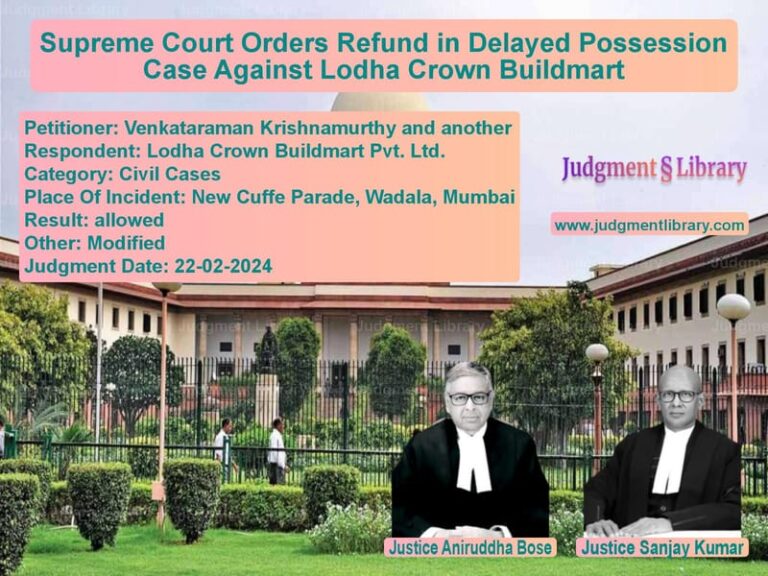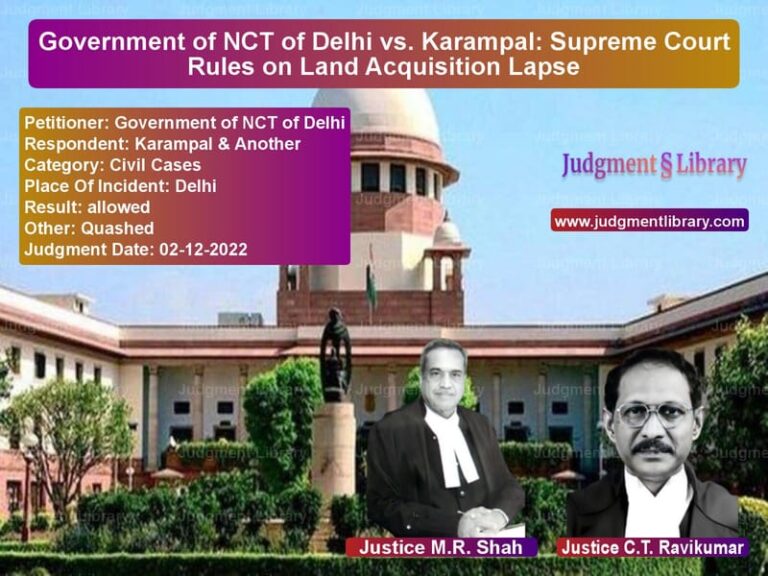Supreme Court Upholds E-Auction of Sri Lakshmi Hotel Under IBC: Key Legal Principles
The Supreme Court of India recently pronounced its judgment in the case of V.S. Palanivel vs. P. Sriram, CS, Liquidator & Ors., addressing a dispute related to the liquidation of Sri Lakshmi Hotel Private Limited under the Insolvency and Bankruptcy Code (IBC), 2016. The case centered around the legality of the e-auction process, the rights of stakeholders, and the impact of external factors such as the COVID-19 pandemic on liquidation proceedings. The Court upheld the auction of the company’s assets to KMC Speciality Hospitals (India) Limited, modifying certain terms to ensure fairness in the process.
Background of the Case
Sri Lakshmi Hotel Private Limited defaulted on loan repayments, leading its financial creditors to initiate insolvency proceedings under the IBC. The National Company Law Tribunal (NCLT) admitted the insolvency application and subsequently ordered the liquidation of the company. The liquidator, appointed under the IBC framework, conducted an e-auction to sell the company’s assets, resulting in the successful bid by KMC Speciality Hospitals.
The appellant, V.S. Palanivel, challenged the auction process, arguing that it was conducted unfairly and that the winning bidder was granted undue extensions to deposit the balance sale consideration. The appellant, a former managing director of Sri Lakshmi Hotel, contended that the liquidator did not follow proper procedure and failed to ensure maximum value realization for the assets.
Key Legal Issues
- Was the e-auction process conducted in accordance with the IBC regulations?
- Was the extension of time granted to the winning bidder legally justified?
- Did the COVID-19 pandemic impact the auction process, necessitating flexibility in payment timelines?
- Did the liquidator act fairly and transparently in determining the reserve price and managing stakeholder interests?
Petitioner’s Arguments
V.S. Palanivel, through his legal counsel, presented several arguments challenging the auction process:
- The liquidator conducted the auction without properly consulting the Stakeholders’ Consultation Committee as required under the IBC.
- The winning bidder failed to deposit the balance sale consideration within the stipulated timeline, violating the terms of the auction.
- The auctioned property was undervalued, and the liquidator should have re-auctioned the assets at a higher reserve price.
- The Income Tax Department had attached the company’s assets during the auction process, affecting the clarity of ownership.
- The extension granted to the successful bidder was arbitrary and unfair, denying other potential bidders a chance to participate.
Respondent’s Arguments
The liquidator and the successful auction bidder, KMC Speciality Hospitals, defended the auction process:
- The auction was conducted in strict compliance with IBC regulations and was monitored by the NCLT.
- The COVID-19 pandemic had created unforeseen challenges, justifying the extension of time for the winning bidder.
- The property was valued based on market conditions, and the petitioner did not participate in the bidding process to offer a higher price.
- The Stakeholders’ Consultation Committee was kept informed, and no objections were raised during the auction process.
- The Income Tax attachment was a procedural issue that did not invalidate the auction.
Supreme Court’s Observations
The Supreme Court analyzed the procedural fairness of the auction and made the following observations:
- The e-auction was lawfully conducted under the IBC framework.
- The COVID-19 pandemic created extraordinary circumstances that justified granting a reasonable extension to the winning bidder.
- The liquidator had taken reasonable steps in determining the reserve price and ensuring transparency in the sale process.
- The petitioner’s challenge was delayed and lacked substantial merit, as he did not object to the process at an earlier stage.
- The auction purchaser had, however, benefited from an undue delay in completing the payment, warranting an additional financial obligation.
Final Judgment
On August 28, 2024, the Supreme Court delivered its verdict:
- The auction was upheld, and KMC Speciality Hospitals was confirmed as the rightful purchaser of Sri Lakshmi Hotel’s assets.
- The auction purchaser was directed to deposit an additional Rs. 5 crores with 9% interest per annum as a balancing measure.
- The petitioner’s objections were dismissed, and the challenge to the auction was rejected.
- The ruling emphasized that stakeholders must raise concerns at the appropriate forum and not challenge liquidation proceedings post facto.
Implications of the Judgment
This ruling has significant legal implications for insolvency and liquidation proceedings:
- Reinforcement of IBC Principles: The judgment affirms that liquidators must conduct auctions transparently but are allowed reasonable discretion in unforeseen situations.
- Flexibility in Liquidation Timelines: The ruling recognizes that external events such as the COVID-19 pandemic can justify procedural flexibility.
- Accountability for Auction Bidders: Purchasers who delay payments may be subjected to additional financial obligations.
- Encouragement for Active Stakeholder Participation: The judgment discourages passive objections and emphasizes the need for timely intervention in IBC proceedings.
Comparison with Previous Cases
The Supreme Court has previously ruled on similar matters, balancing the interests of bidders, creditors, and the larger insolvency framework:
- ArcelorMittal India vs. Satish Kumar Gupta (2018): The Court upheld the sanctity of the IBC process in insolvency resolution.
- Swiss Ribbons vs. Union of India (2019): This case reaffirmed the constitutional validity of IBC and clarified the roles of different stakeholders.
- Embassy Property Developments vs. State of Karnataka (2020): The Court ruled that IBC proceedings must be conducted in a manner that ensures maximum value realization.
Conclusion
The Supreme Court’s decision in V.S. Palanivel vs. P. Sriram, CS, Liquidator & Ors. reinforces the integrity of the IBC process and the importance of structured liquidation proceedings. The judgment ensures that insolvency processes remain fair, transparent, and adaptable to extraordinary circumstances. The ruling also highlights that challenges to liquidation sales must be raised in a timely manner and that procedural fairness must be maintained while accommodating genuine difficulties faced by auction purchasers.
Petitioner Name: V.S. Palanivel.Respondent Name: P. Sriram, CS, Liquidator.Judgment By: Justice Hima Kohli, Justice Ahsanuddin Amanullah.Place Of Incident: Tiruchirappalli, Tamil Nadu.Judgment Date: 28-08-2024.
Don’t miss out on the full details! Download the complete judgment in PDF format below and gain valuable insights instantly!
Download Judgment: v.s.-palanivel-vs-p.-sriram,-cs,-liqui-supreme-court-of-india-judgment-dated-28-08-2024.pdf
Directly Download Judgment: Directly download this Judgment
See all petitions in Company Law
See all petitions in Bankruptcy and Insolvency
See all petitions in Corporate Governance
See all petitions in unfair trade practices
See all petitions in Judgment by Hima Kohli
See all petitions in Judgment by Ahsanuddin Amanullah
See all petitions in partially allowed
See all petitions in Modified
See all petitions in supreme court of India judgments August 2024
See all petitions in 2024 judgments
See all posts in Corporate and Commercial Cases Category
See all allowed petitions in Corporate and Commercial Cases Category
See all Dismissed petitions in Corporate and Commercial Cases Category
See all partially allowed petitions in Corporate and Commercial Cases Category







